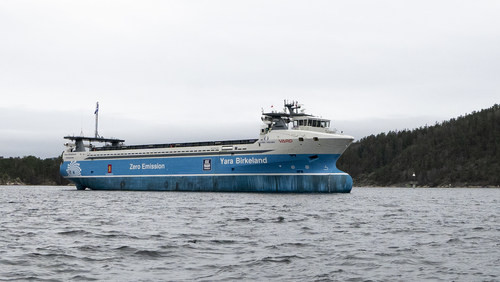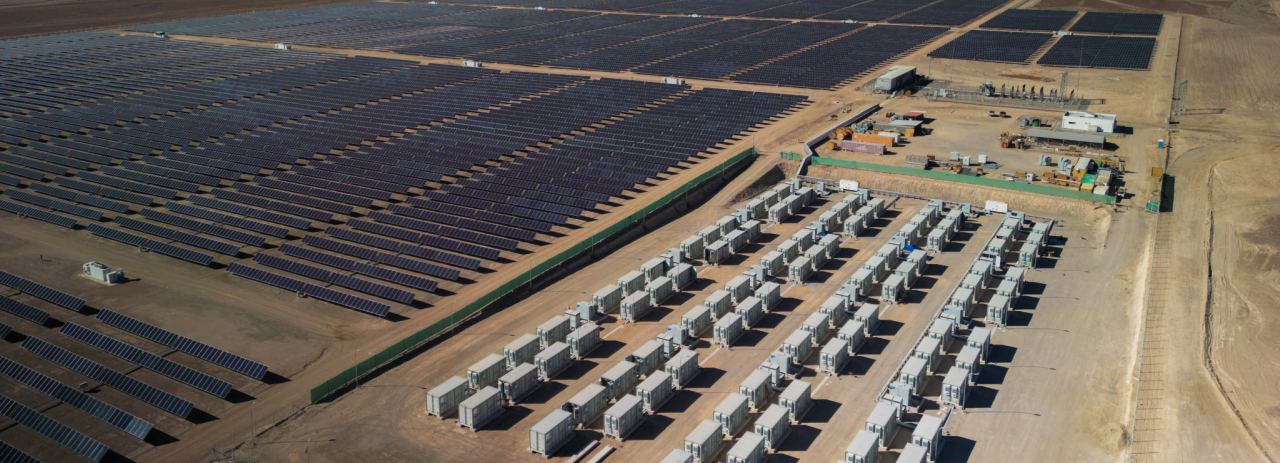Leclanche battery system powered Yara Birkeland electric container ship to start commercial ops
The Yara Birkeland, the world's first autonomous and fully electric-powered container ship, is about to begin commercial operation. A two-year trial period should lead to the fully autonomous operation of the vessel along the Norwegian coast. It will be fully powered by a high-energy lithium-ion battery system from Leclanché.
The zero-emission energy secure power is supplied by a battery system 6.7 MWh to liquid cooling to ensure optimum operating temperature. Leclanché's Marine Rack System (MRS) ensures optimized temperature control of cells as well as their reliable and permanent operation for at least 10 years. In addition, the MRS offers state-of-the-art overheating protection and an integrated fire protection system specifically designed and certified for marine requirements.
The Yara Birkeland made her maiden voyage to Oslo in mid-November and then sailed to Porsgrunn, the southern Norwegian production site of Yara International, fertilizer maker, and shipowner.
Leclanché supplied a 6.7 MWh battery system (which is the same energy as 130 Tesla Model 3 batteries) to power the container ship which is 80 meters long and 15 meters wide and carries 3 ' 120 tonnes of freight or 120 standard containers (TEU). This electrically powered "green vessel" will operate at a service speed of approximately 6 knots, with a maximum speed of 13 knots.
" Yara is constantly on the lookout for opportunities to reduce its climate footprint and achieve its core vision, which is to feed the world responsibly. Engaging in a technically difficult project like the Yara Birkeland, in collaboration with our technological partner Kongsberg Maritime, is only a small effort in the big challenge that we face as an industrial player among many others. A zero-emission ship to get our products from production to market shows that it is possible to make a positive contribution to the change required by eliminating greenhouse gases. As one of the founders of Yara said at the beginning of the last century, " when you want, you can ". Leclanché technology allows us to have a vessel powered by batteries and recharged with electricity using green hydroelectric energy. This is a voluntary step in the direction of ecology and an encouragement for others to invest in future technologies as well, " said Jon Sletten, Project Manager Yara Birkeland.
" We are very proud to be able to contribute to the success of this unique project. With its battery system for the Yara Birkeland, Leclanché contributes to a reduction in greenhouse gas emissions equivalent to 40,000 road trips by container trucks per year, not to mention improving road safety, reducing noise pollution, and increasing logistics efficiency, " said Anil Srivastava, CEO of Leclanché.
"Annual savings in operating costs, both in fuel and crew, are estimated up to 90 percent. They make autonomous and battery-powered vessels competitive in international trade. In combination with new emerging technologies and the integration of alternative green fuels, including clean hydrogen, we will continue to open up new possibilities for our customers, industry, and the planet ".
The Yara Birkeland's battery system is equipped with lithium-ion cells produced at Leclanché's automated production site in Willstätt, Germany, and battery modules made in Switzerland. High energy density cells combined with a long life of 8,000 cycles at 80 percent DoD, with operating temperature ranges of -20 to + 55 ° C, form the heart of the battery system. The Leclanché Marine Rack System consists of 20 chains with 51 modules of 32 cells each, for a total of 32,640 cells. The battery system has built-in redundancy, with eight separate battery rooms: the vessel can continue operations even if several chains are emptied or stop functioning.
When it comes to battery systems for marine applications, effective overheating protection is a must. To prevent a fire at sea, Leclanché has specially developed the DNV-GL certified modular MRS. Each battery string contains gas and smoke detectors, redundant thermal monitoring, and a cooling system to prevent overheating and thermal incidents. If despite everything, a thermal incident should occur, the Fifi4Marine fire extinguisher system kicks in: based on ecological foam, it cools and extinguishes quickly and effectively any possible outbreak of fire.
Once the trial period is over, the Yara Birkeland will sail completely autonomously and transport products in containers from the Yara International production plant in Herøya to the port of Brevik. Yara International is pursuing a zero-emission strategy with the fully-electric propulsion solution: the operation of the vessel will replace around 40,000 truck trips per year and the associated NOx and CO2 emissions. It also reduces noise and air pollution when in port. The batteries are charged automatically with electricity from renewable sources.
" The Leclanché Marine Rack System offers 30 percent higher energy density and up to 230 percent higher lifecycle than competing systems - in addition to its reputation for having the most battery system design. safe, " said Guillaume Clément, VP e-Marine, Leclanché .
" Thanks to Yara, the shipping industry has entered a new era where the viability of sustainable shipping is demonstrated for a very wide range of ships and businesses ."






















